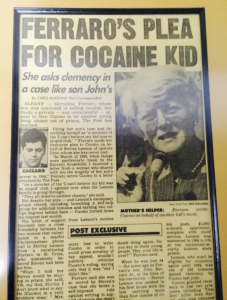Some experiences, big or small, can change the course of our lives forever. That is what happened when Jason Flom saw a story in the paper that mentioned how 32-year-old Steven Lennon had been convicted and sentenced to 15 years to life in prison in 1984 for possession of 4.2 ounces of cocaine. “When I saw that, all I could think was, ‘that could have been me,’” Flom told Worth. Since that day, the music industry titan and founder of Lava Records has dedicated every spare moment of his time to learning about the criminal justice system, educating others on the corruption that takes place at every level leading up to incarceration and beyond, and helping those who are wrongfully convicted.
prison in 1984 for possession of 4.2 ounces of cocaine. “When I saw that, all I could think was, ‘that could have been me,’” Flom told Worth. Since that day, the music industry titan and founder of Lava Records has dedicated every spare moment of his time to learning about the criminal justice system, educating others on the corruption that takes place at every level leading up to incarceration and beyond, and helping those who are wrongfully convicted.
Jason Flom and Jeff Kempler have been business partners and friends for three decades. They are cofounders of Lava Records, a record label that has signed artists such as Greta Van Fleet, Jessie J, Kid Rock and Lorde, among many others, and together, they are in the business of telling people’s stories—whether that be for the elevation of their signed artists or for the advocation for the wrongfully convicted. Although criminal justice reform might not seem like it relates to the music industry, Flom is really in the business of helping people be heard.

He hosts two podcasts through his and Kempler’s company, Lava For Good—Wrongful Convictions and Righteous Convictions. On the Wrongful Convictions podcast, Flom sits down with people who have been victims of our justice system to hear their stories and expose the causes of their mistreatment; on the Righteous Convictions podcast, he sits down with experts and activists to take a broader look at policy illusions and overarching issues that intersect with criminal justice reform. What sets Flom apart from other advocates is that he goes above and beyond for everyone he comes in contact with. In a recent interview with Kiera Newsome, a passionate woman who endured many grievous miscarriages of justice at the hands of our legal system (who you’ll hear more from in part two), she told Worth: “I’m looking at how much he just gave me to help me, and then he turned around to do that for somebody else, and more and more and more. And I’m like, ‘this is an angel.’”
In addition to dedicating his time and resources to the individuals who have been failed by our justice system, Flom is a founding board member of the Innocence Project and has been working with them since 1993. The Innocence Project is a nonprofit organization that provides its clients with pro bono legal services and utilizes reliable DNA testing—something that might not have been available during the time of their clients’ original trials. They are one of the top organizations generating systemic change and criminal justice reform, working on a case-by-case basis to save lives and ensure that justice is served. However, the Innocence Project, along with an extensive list of other nonprofit organizations, can’t do this alone. Jason Flom serves as an example of how much impact can be made by one person dedicating their time, money and energy to this cause, but even the smallest bit counts. According to Kempler, it can start with something as simple as understanding. “Everyone has the capacity to be part of a solution,” he says. “It does not require that you devote yourself 100 percent…You can make a difference by simply being aware and having a proper understanding of the truth. That is a good way to start caring.”
Worth sat down with Kempler to hear how he and Flom got involved in criminal justice reform, why this is such an important issue and how people can learn to support justice, not conviction.
Q: Oftentimes, conversations about large topics, such as wrongful conviction and incarceration, can be intimidating to have with friends and family. What are some important things to bear in mind when having these conversations?
A: The incarceration, let alone execution, of an innocent person is a travesty but it also means a lot of other things. It is a public safety issue—meaning that the actual perpetrator was not incarcerated. Next, for the victim’s family, there is no closure, no justice. And the state probably spent hundreds of thousands, if not millions, of dollars in trial and incarceration of the wrong person—so you’re a taxpayer funding that. And then for folks who get out in states that have access to civil judgments for wrongful conviction, they may win an eight-figure civil judgment against the state for wrongful conviction. Guess who’s paying for that?

Do you think that gaining awareness and learning about this can affect peoples’ actions in ways that they might not even realize?
The likelihood of you having an impact on a friend or an acquaintance is much higher than when you encounter something randomly or in a newspaper. Also, some people are motivated a lot by statistics—numbers are easy to remember sometimes. So, being just aware of like, “Hey, did you know that one out of every nine people who are executed are conclusively proven to have been innocent after the fact?” can be useful.
With a problem so incredibly sprawling as this one that touches so many different aspects of life, how do you and Jason stay motivated and undaunted?
It feels like a moral imperative. So no matter how daunting it is, not doing anything, it’s not an option. There’s no not doing it. But I think the more practical day-to-day is, we talk about in these terms a set of macro tasks and a set of micro tasks, and the micro tasks are significant—like, there’s a person on death row who shouldn’t be there. Macro is the general: “What do we do about the fact that there’s a huge amount of systemic racism that permeates the legislative, judicial and executive branches as relates to criminal justice?” There’s just no question about it. It’s in the historical record.
What is the social impact of wrongful incarceration?
Prosecutorial misconduct, over-sentencing, private prisons, bad drug policy, these things are all just really inefficient. They suck money out of innovation; they suck money out of education; they suck money out of infrastructure; they suck money out of national security. There’s scientific research. Consider the costs to society when the state can put a person in prison for a nonviolent pot possession charge.
What are some ways people can get involved in the criminal justice space in a productive way?
Listening to the podcast(s) is a really good start. I think it’s important to simply be aware of this as a kind of societal problem, and then from there, you become more aware that that is in direct correlation to things like poverty, race, literacy, mental health—all of which are large-scale problems affecting large populations.
The other thing is, if you get a jury notice, serve on a jury and do so with a cynical, probing mind. Not all things that are presented as true from a prosecutorial evidence perspective really are true. And there are a lot of mistakes and bad behavior in that space. So, being a good citizen, serving on juries, voting—and being a conscientious voter—are all simple things you can do.
This interview has been condensed for length and clarity.
You can check out part two of this series here.







